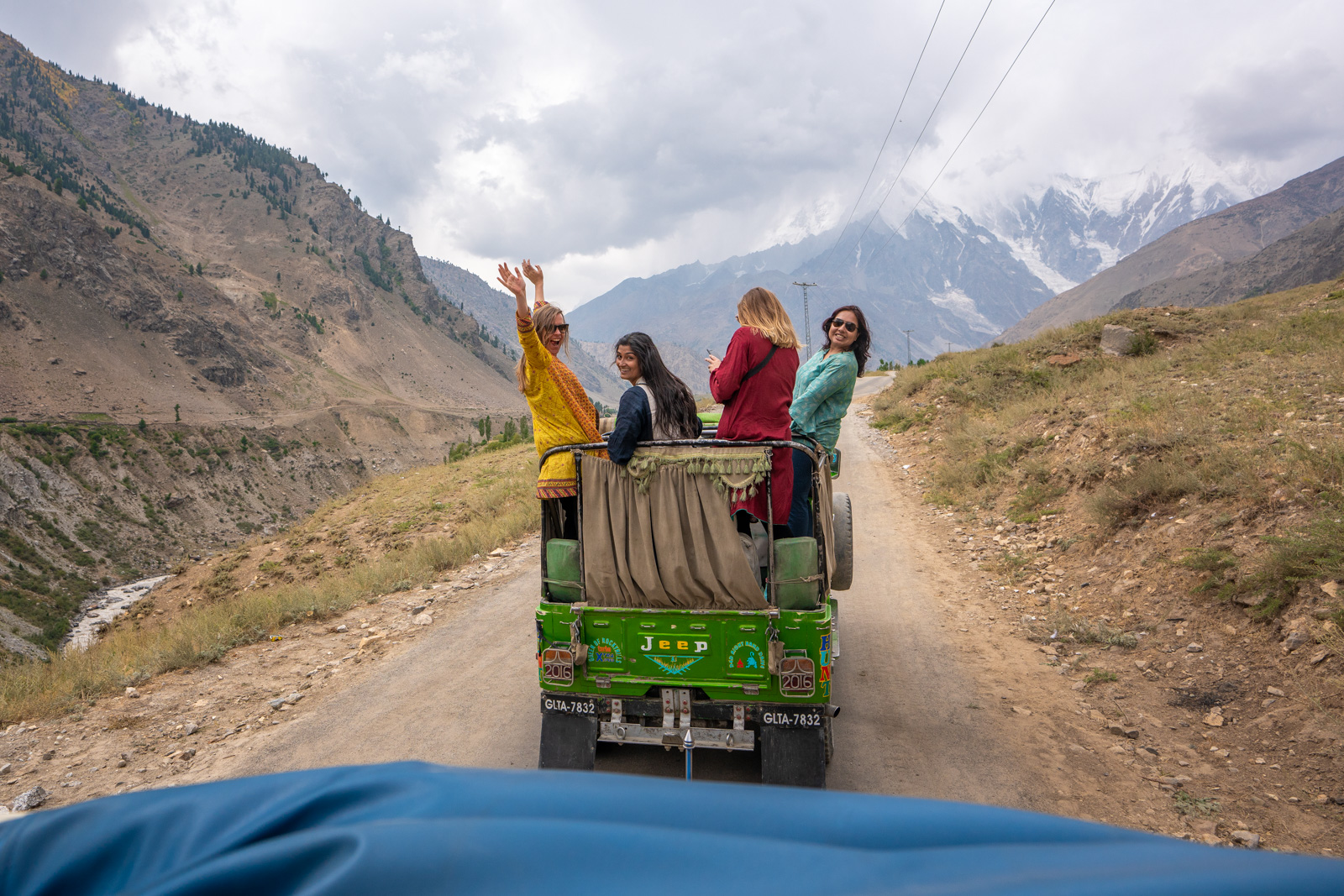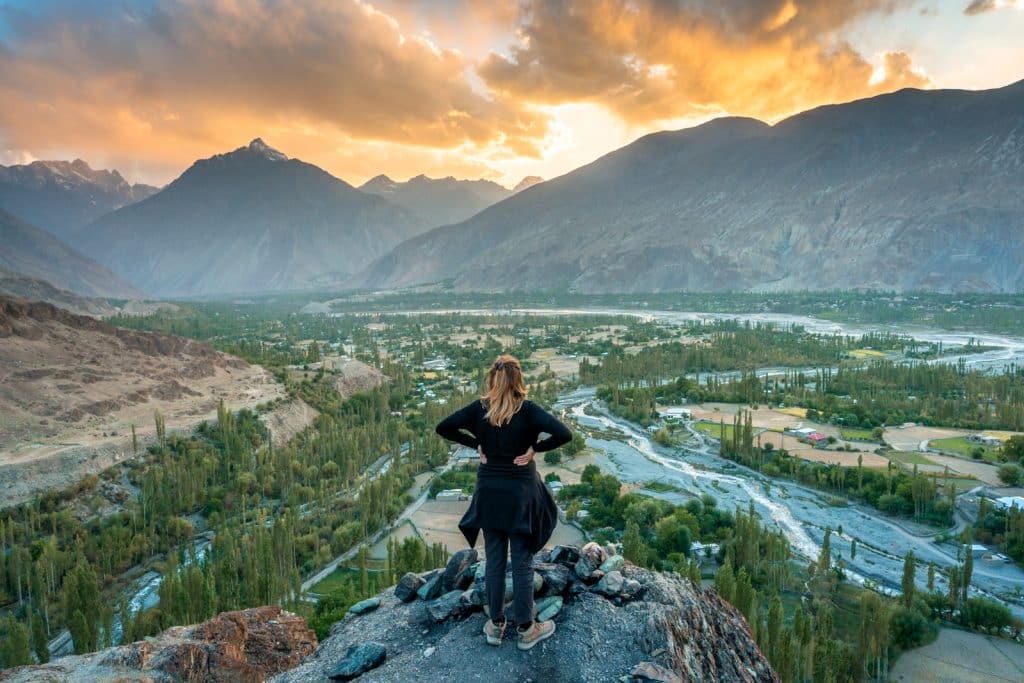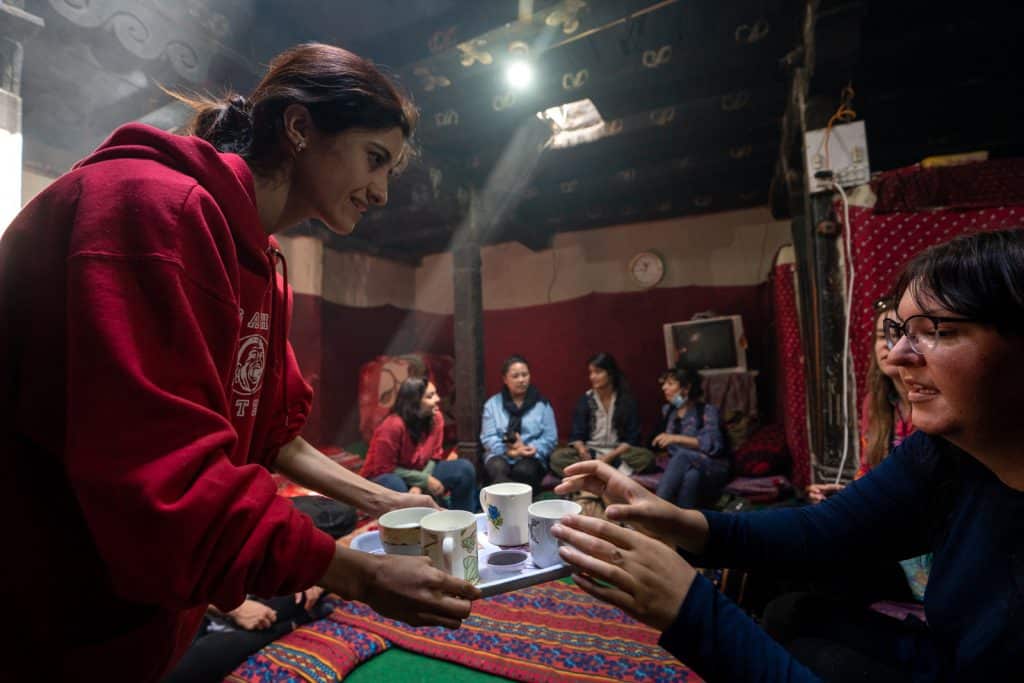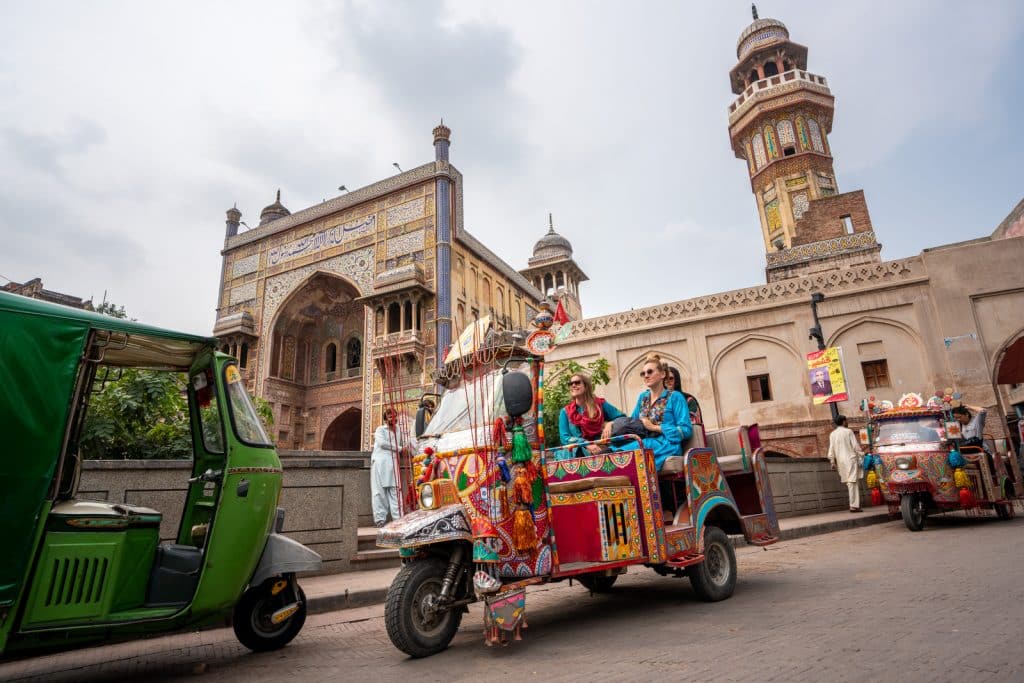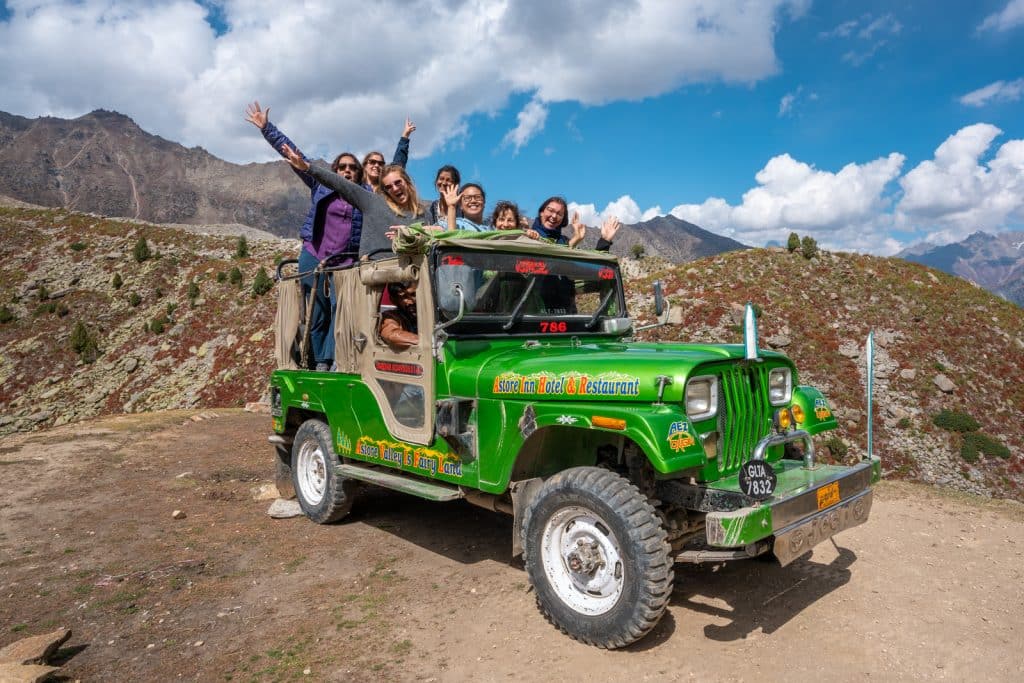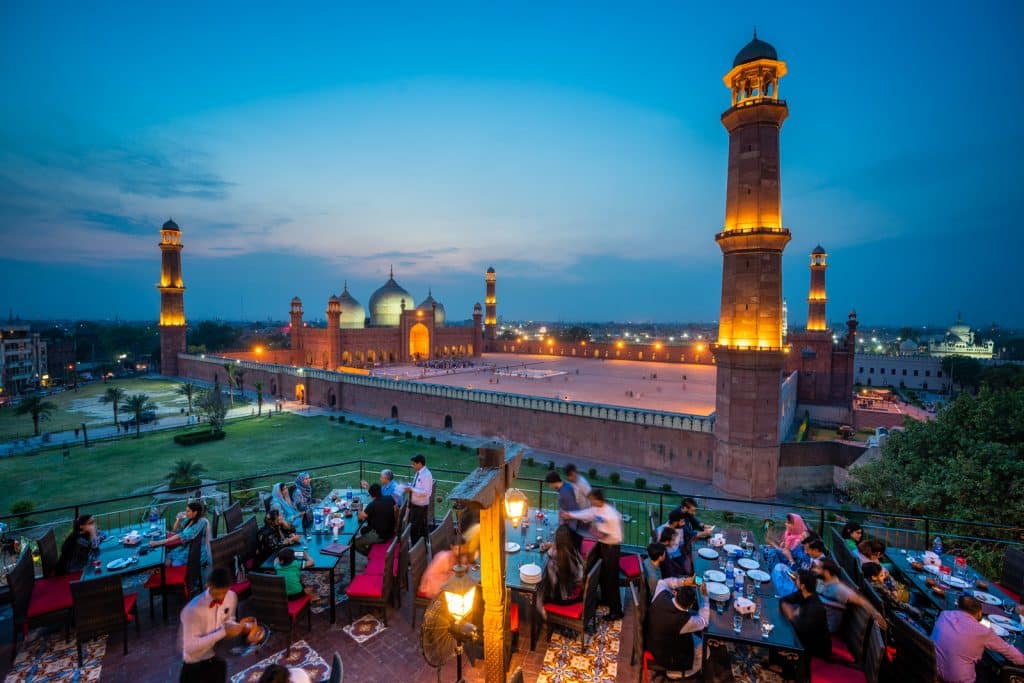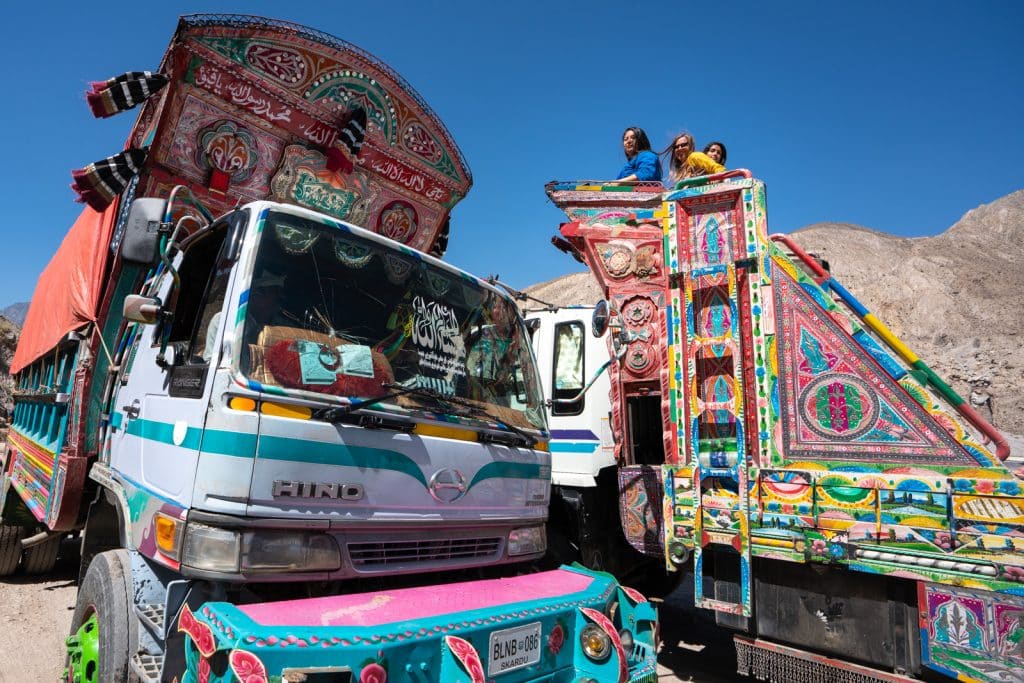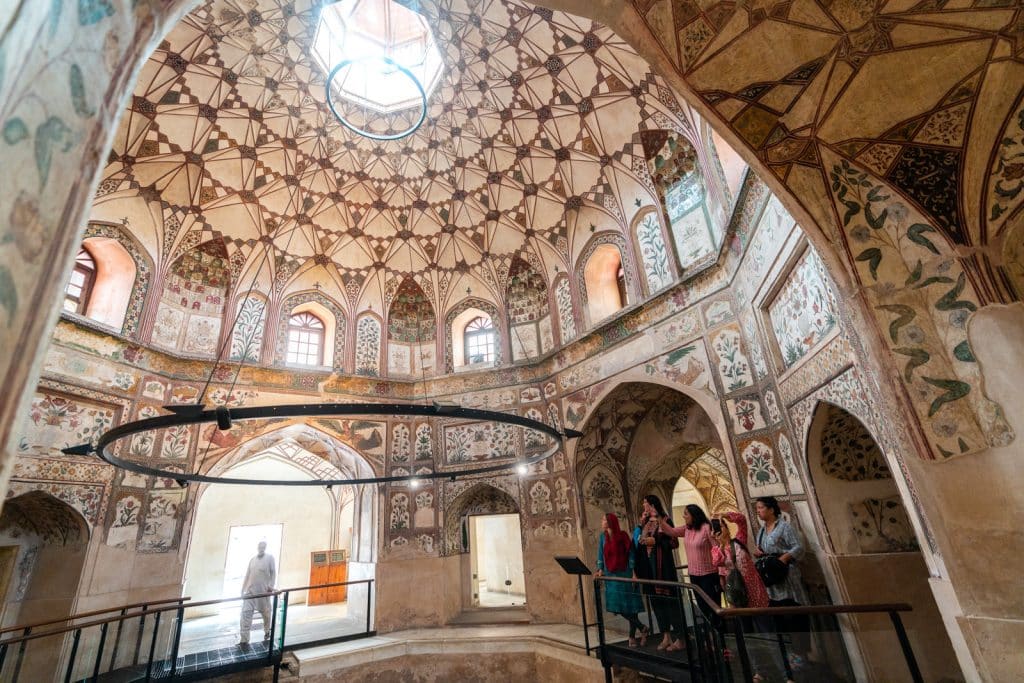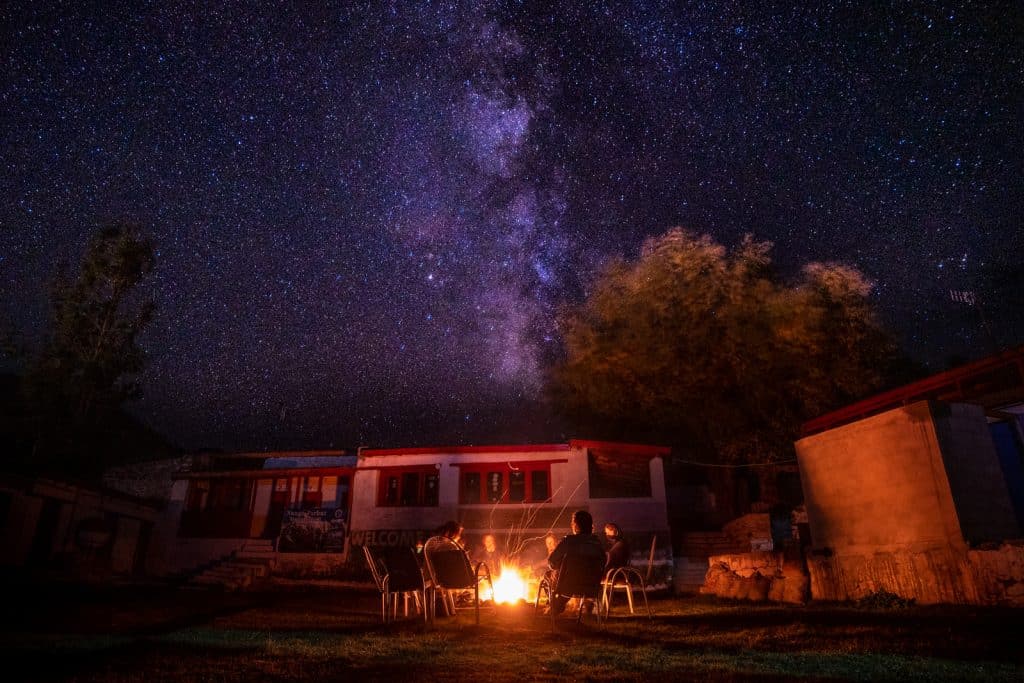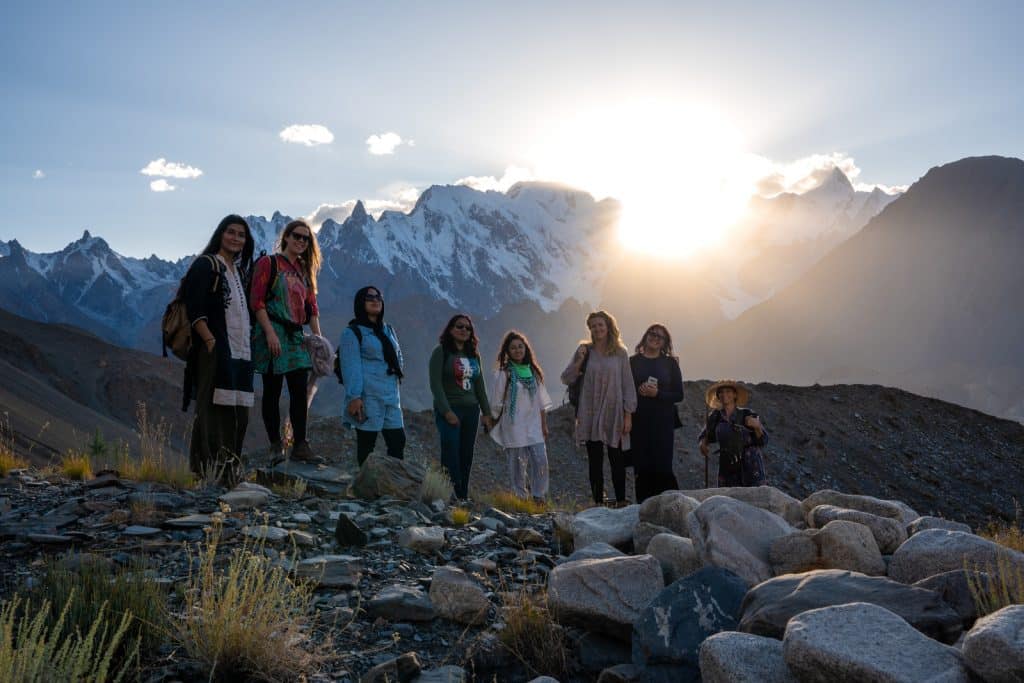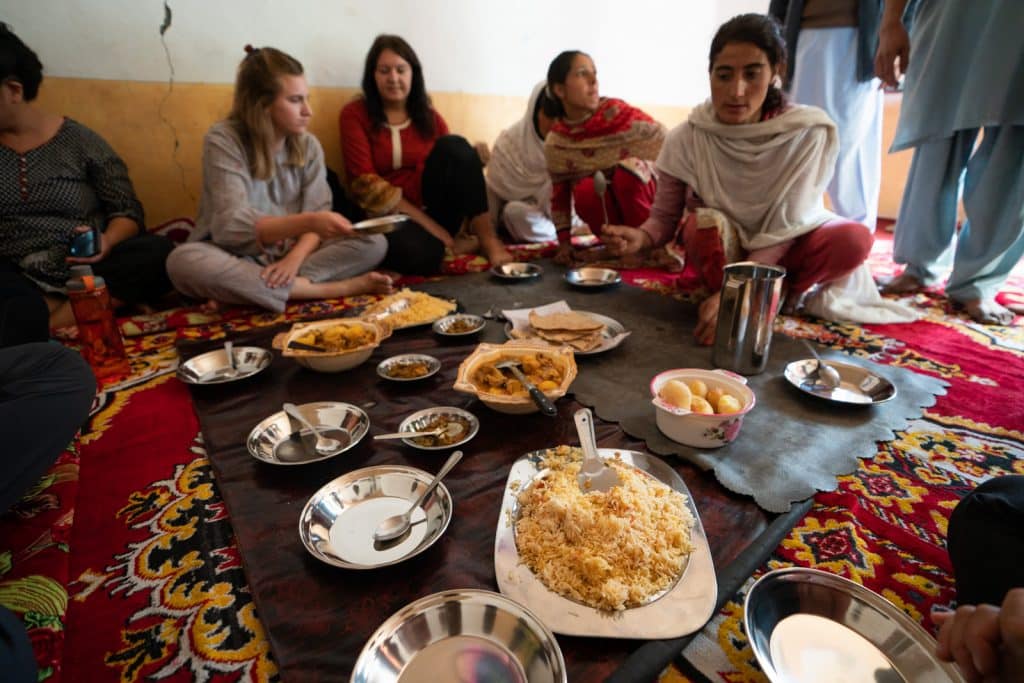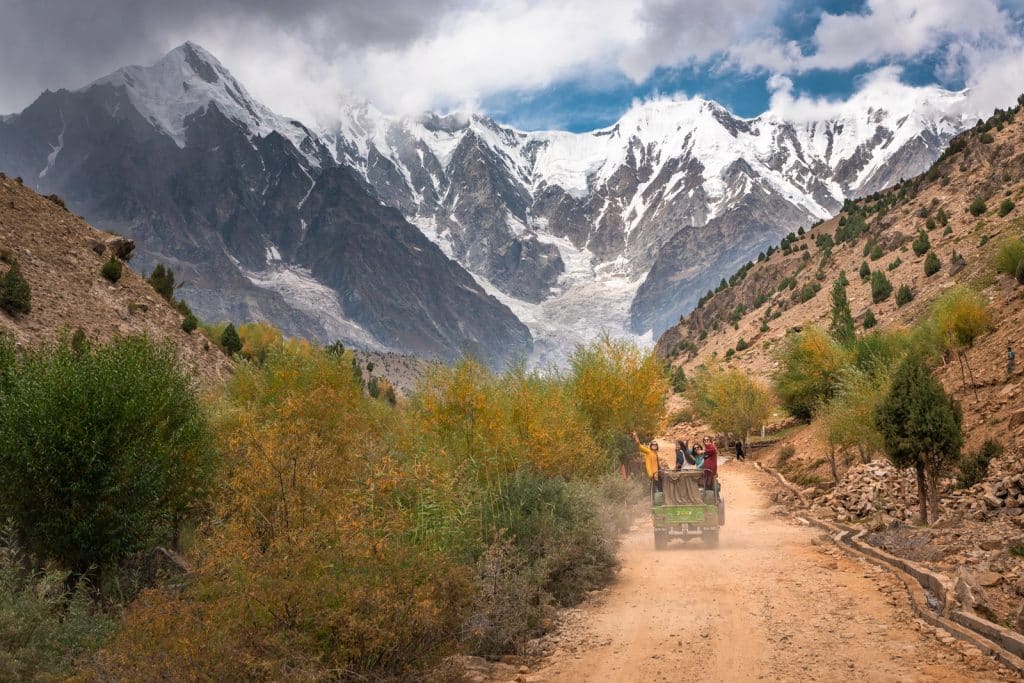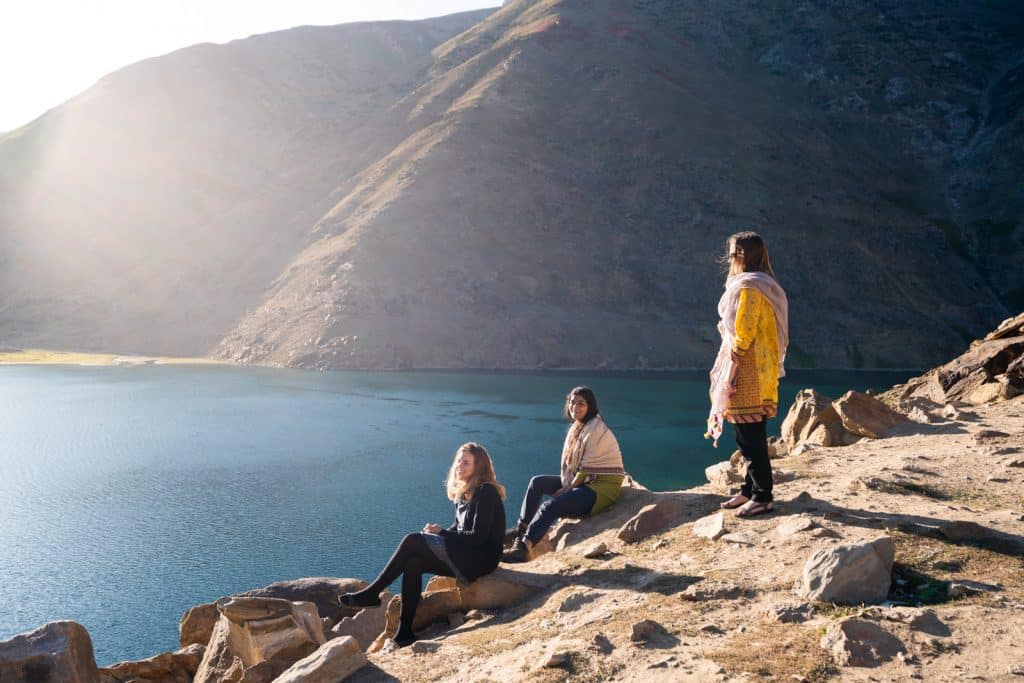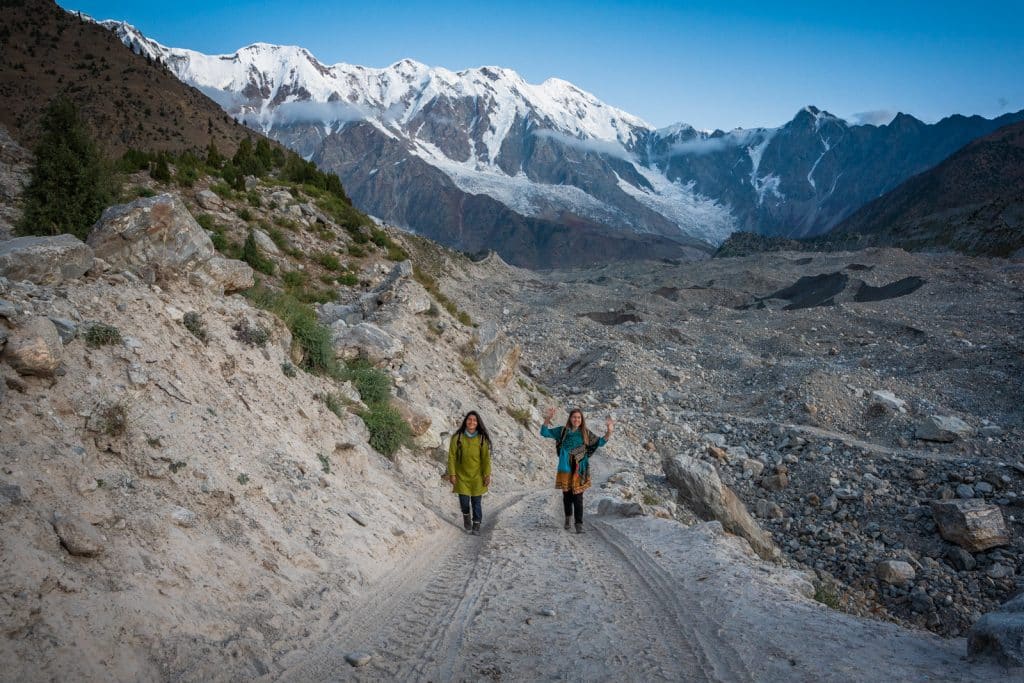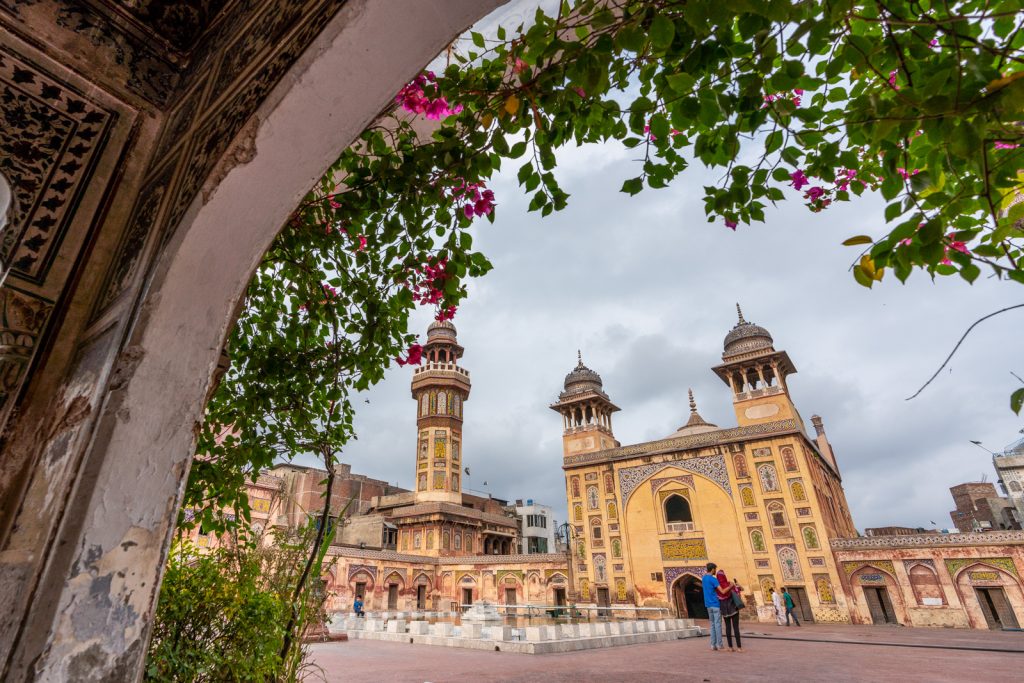Pakistan women’s tours in 2024
A warm smile as someone invites you in for chai. Kebabs sizzling while the call to prayer sings from mosque minarets. Sunrises blanketing snowy mountains in gold. Swapping stories from the comfort of pillows ‘round a warm stove in the evening.
These are moments that made us fall in love with Pakistan. We want to share them with you.
This won’t be your typical tour de Pakistan. We’re not squeezing in as much as humanly possible, rushing you from spot to spot, nor showing you a polished version. You’ll be fully immersed in Pakistan: traditional homes, offbeat locations, local food and guides, treks with nary a soul in sight.
Rich and poor, urban and rural, liberal and conservative: our Pakistan women’s tour will show you the diversity that makes Pakistan what it is. And then some.
Tour gallery
Tour itinerary
When traveling in Pakistan, things don’t always go according to plan. From spontaneous chai invites to landslides blocking whole highways, delays can happen anywhere. Flexibility is key. If we have to make changes on the fly, don’t fret; we’ll still try to do everything mentioned.
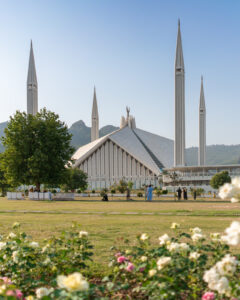
We’ll take it easy on the first day, and do some simple sightseeing in Islamabad. First up is local clothes shopping, then visits to Pakistan Monument and Faisal Mosque.
Sleeping: Islamabad hotel
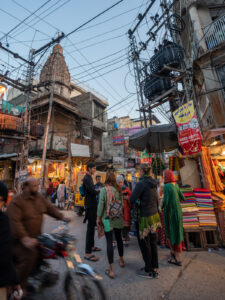
Pakistan’s famous truck art workshops will lend a colorful start to our day. Once done ogling, we’ll spend the afternoon and early evening roaming around the winding ways of old Rawalpindi, Islamabad’s much older sister city.
Sleeping: Islamabad hotel
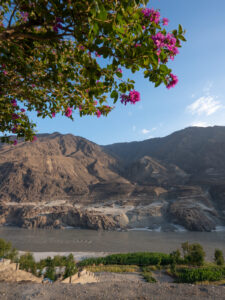
So begins the long drive to the mountains in the north! Though we’ll be in the car most of the day, the views will be undeniably epic. If the pass is open, we’ll stop for a scenic lunch and photos at Lulusar Lake and the 4,100m Babusar Pass. Otherwise, we’ll start heading up the Karakoram Highway through Besham.
Sleeping: Chilas guesthouse
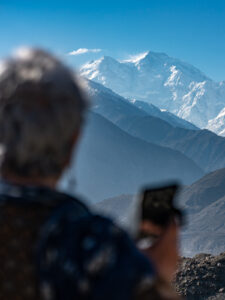
We’ll continue on the most famous road in Pakistan: the Karakoram Highway. As we glide along smooth roads between some of the world’s highest mountains, we’ll stop at a few particularly nice viewpoints en-route before turning off onto the stunning road into Ghizer Valley. It’s a long drive, but our final destination is worth it.
Sleeping: Yasin guesthouse
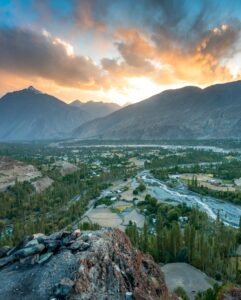
No more driving—it’s time to relax! We’ll explore the villages of central Yasin Valley, with stops in local homes for a bite of homemade food. As the sun sets, we’ll trek up to the ruins of Muduri Fort, where people of Yasin battled invading Sikh forces in the late 1800s.
Sleeping: Yasin guesthouse
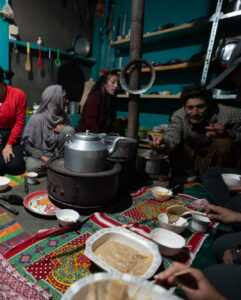
For a deeper dive into Yasin’s culture, we’ll spend more time with a local family. You’ll get to see a traditional home, see how food is prepared, and go on a hike to another viewpoint with one of the women in the family.
Sleeping: Yasin guesthouse
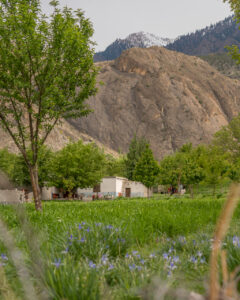
Say your goodbyes to Yasin—it’s time to head to Nagar district! We’ll drive to Minapin village, an idyllic hamlet fed by glaciers running from the towering Rakaposhi mountain.
Sleeping: Minapin organic guesthouse
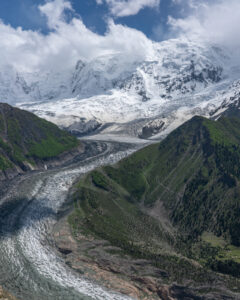
Rakaposhi Base Camp is one of the most beautiful treks in northern Pakistan. We’ll set out from Minapin, climbing for 4-7 hours to an elevation of 3,500m (11,500′). The trek is about 13 km long, but no need to rush: we’ll camp in tents set up in Hapakun, a grassy meadow area slightly below the glacier ridge.
Sleeping: Hapakun camping
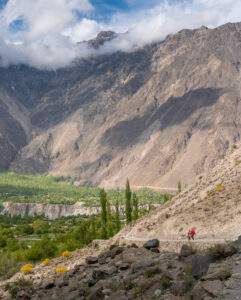
And down we go! Returning the same way we came, we’ll head back to the organic guesthouse in Minapin. There, you can enjoy a hot shower, relax under fruit trees, or wander around the village if you so choose.
Sleeping: Minapin guesthouse
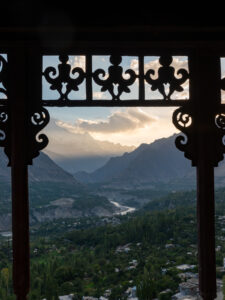
Tourist hats on: we’ll be visiting the most popular destinations in Hunza today. The Baltit and Altit forts are the best preserved in the region, perched upon hilltops offering fantastic views of Hunza Valley. In between, we’ll dine at a woman-owned cafe, squeeze in some souvenir shopping, then head up north to our home for the next few days: Gulmit village.
Sleeping: Gulmit homestay
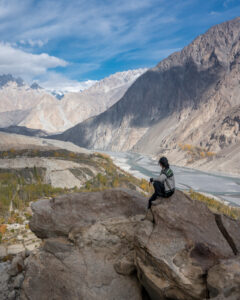
This day is all about exploring Gulmit—a village that’s making an effort to attract more tourists through community-run initiatives. We’ll shop at a women-run carpet center, visit one of the oldest houses in town, and climb up to the ruins of Ondra Fort to enjoy views over Gulmit.
Sleeping: Gulmit homestay
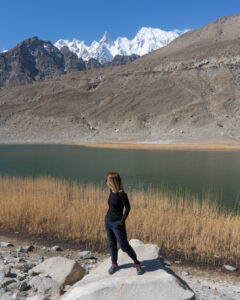
Today, an easy hike! We’ll start at Borith Lake, a small, brackish lake at the base of snowy mountains. Take a dip if you dare, or simply sit and enjoy chai with a view. Afterwards, we’ll walk for an hour or two along a village track to the sweeping White Glacier viewpoint.
Sleeping: Gulmit homestay
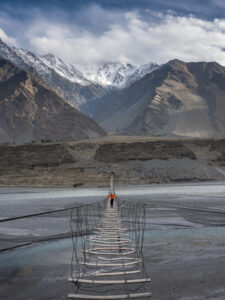
Time for one of the most harrowing—but beautiful—treks in Hunza: the suspension bridge trek. The 9 km trek will take us between two rickety suspension bridges: Hussaini and Passu. Never fear, the bridges are more secure than they seem and we’ll have a local female guide with us the whole way. If you’re afraid of heights, you can also stay back and explore Gulmit or Passu while others go out trekking.
Sleeping: Gulmit homestay
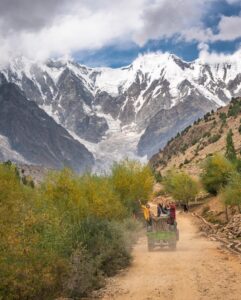
A long but epic driving day. We’ll start in the van, but eventually switch to jeeps to reach our final destination: Tarashing, a tiny village at the base of Nanga Parbat, one of the highest mountains in Pakistan.
Sleeping: Tarashing guesthouse
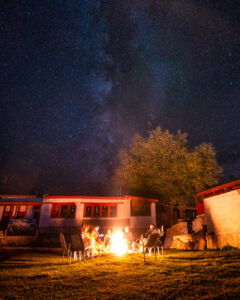
Let’s get up close and personal with Pakistan’s “Killer Mountain”! (Don’t worry, the trek is safe.) The 10 km trek to the base camp is a gently sloping 3-4 hour track, leading to wide open meadows where cows graze by trickling streams. We’ll enjoy a picnic lunch, then you can either trek back or take a jeep to return to the guesthouse.
Sleeping: Tarashing guesthouse

Alas, our time in the mountains soon comes to an end! Today we start driving back to Chilas (or further, depending on timing and weather).
Sleeping: Chilas guesthouse
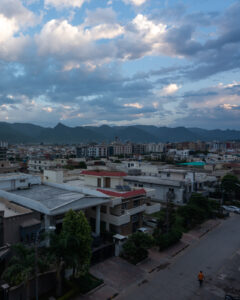
Long haul driving day! To make the long road feel a bit shorter, we break up the drive to Lahore in Islamabad. Everyone can rest, have all the comforts they’ve been missing in the mountains, and get fresh for a cultural dive the next day.
Sleeping: Islamabad hotel
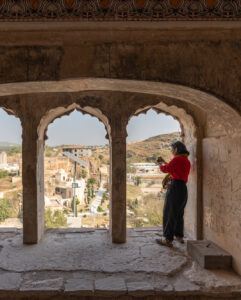
We’ll take the historic Grand Trunk Road to Lahore. Circus though it may seem, it’s worth the hassle so we can visit the sprawling Rohtas Fort and a few foodie favorites en route.
Sleeping: Lahore hotel

Dive deep into Lahore by starting with more off-the-beaten-track sights: a Mughal tomb outside the city, secret shrines within the limits, and a Sufi music night at a hip cafe.
Sleeping: Lahore hotel
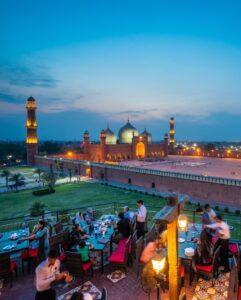
Our final day: time to live it up in Lahore! We’ll fuel up with a traditional local breakfast—an important ritual in Lahore—before hitting the winding streets of the Walled City to seek out some of Lahore’s most majestic Mughal relics. The roaring crowds and pounding drums of the Wagah Border ceremony will sound out our afternoon, and we’ll finish the day in style with a lavish dinner overlooking Badshahi Mosque.
Sleeping: Lahore hotel
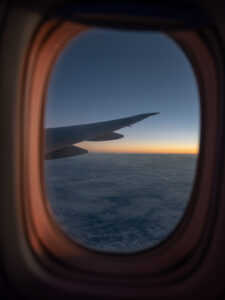
All good things must come to an end! Most people fly out at some point on this day, though you’re certainly welcome to stay on longer—many women do 😉
Testimonials
Tour leaders
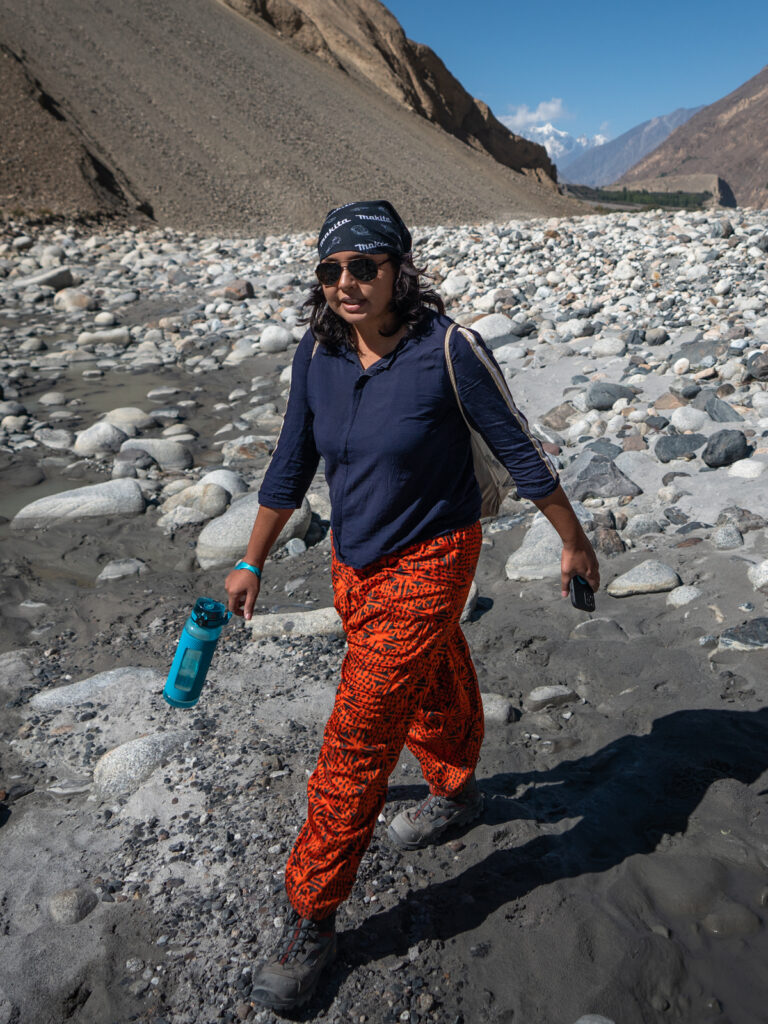
Aneeqa Ali (Local)
Aneeqa is a trailblazing entrepreneur from Lahore (ish). For years, she’s run one of the few women-owned travel companies in Pakistan, The Mad Hatters. Despite cultural barriers, she’s traveled all over Pakistan both solo and with others. She’s never afraid to stand her ground in the face of chaos (or men being difficult) and never says no to requests for food quests.
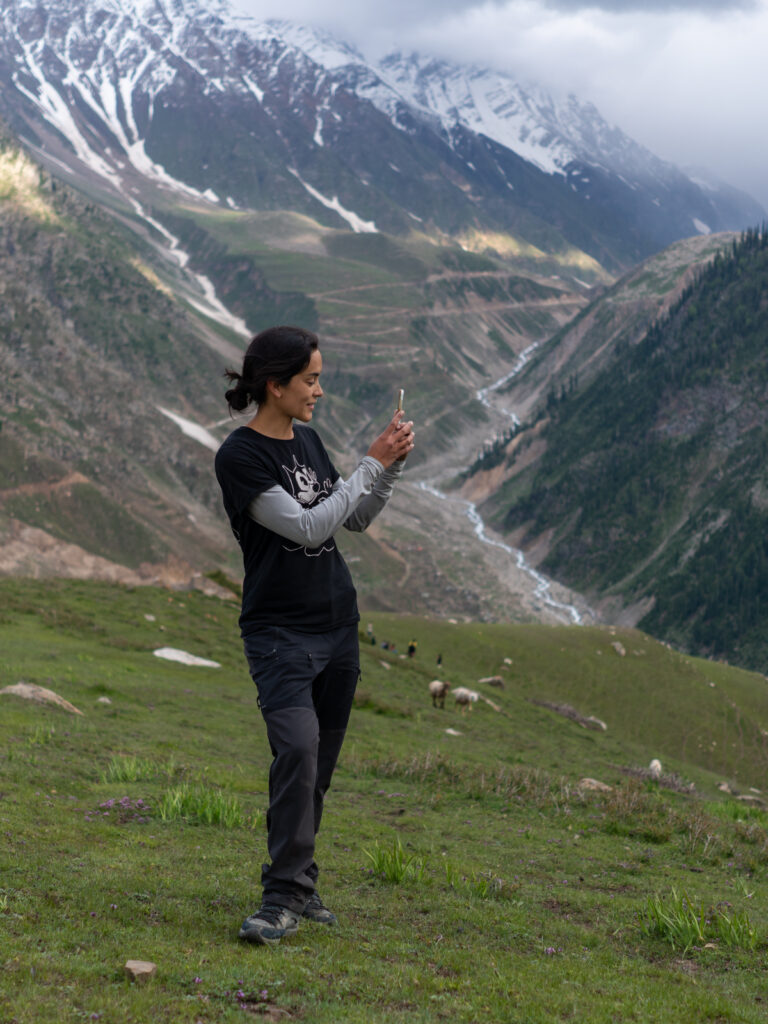
Alex Reynolds (Foreign)
Alexandra (Alex) is a solo female traveler, writer, and photographer from the United States. She began traveling Pakistan in 2016—blogging about it excessively the entire time—and started leading tours in 2019. After many a year and many a misadventure, she can now say she’s pet goats in every single province and territory of Pakistan.
Inclusions
Included
- 3x meals daily
- Accommodation during the tour
- Transportation during the tour
- Letter of invitation (LOI) for e-visa
- Airport transfer
- Entry fees
Not included
- Flight tickets
- Visa fees
- Souvenirs
- Alcohol
- Snacks
- Tips for guides and drivers (optional)
Payment and cancellations
Payments can be made by bank transfer, Wise (all major cards and most currencies), or credit card (Pakistani rupees). A deposit of $500 is required to secure your position on the tour.
Tour cancellation policy
If you need to cancel your tour for some reason, our cancellation policy is:
- 2+ months in advance: Full refund minus deposit
- 1-2 months in advance: 50% refund minus deposit
- < 1 month in advance: 25% refund minus deposit
- < 2 weeks in advance: Too last minute! No refunds, but we can move your payment (minus deposit) to another tour.
COVID cancellation policy
We understand that travel plans can change in the blink of an eye in times like these, so we offer the following cancellation policy for coronavirus-related issues:
- If we cancel the trip: Full refund minus $100 to cover our time, transfer fees, and any vendor payments we might have made already.
- If you cancel your trip due to COVID concerns: Same cancellation policy as above.
- If you test positive before your flight and can’t come: You can move your payment minus the deposit to a future tour.
FAQ
This is a tour made for female travelers by female travelers.
Both Aneeqa and I have traveled all over Pakistan independently and otherwise; you won’t find many women working in Pakistan’s travelsphere with more experience than us. To quote one of our tour guests: we’re “badass motherfuckers”.
Though rich, our experiences have proven Pakistan isn’t an easy place to travel as a woman. Nevertheless, we love the country, and want more women to travel Pakistan. This Pakistan women’s tour is meant to help more female travelers come and experience a positive side of the country, and normalize the idea of women traveling without men there (it’s still unusual!).
Yes, we designed our Pakistan women’s tour with responsible tourism in mind. On this tour, we will…
- Stay in local homestays and guesthouses instead of international chains.
- Eat local, seasonal food as often as possible.
- Travel to more offbeat locations to distribute our tourist money.
- Use locals instead of outsiders as guides, and hire female guides where possible.
- Visit women-run initiatives and shop at women-run businesses.
- Reduce our waste by filtering water instead of buying single-use bottles, carrying reusable shopping bags, and using reusable boxes and eating utensils for packed lunches.
- Pay all drivers, guides, and hosts a fair wage for their time.
To keep things intimate and encourage local interactions we’re capping the number at 10 women.
We’ll ask you a few questions before giving you a spot on a tour. Don’t take it personally; we want to make sure everyone is on the same page since the group is small.
We’ll stay at hotels, guesthouses, and traditional homestays. You’ll have to share double rooms in hotels and guesthouses. In homestays, part of the group may have to share one common sleeping space and sleep on the floor. It’s how local people sleep!
Connectivity is limited at times. Though cities have decent signals and wifi, mobile signals in Gilgit Baltistan territory are unreliable. Wifi is slow (if even available) and many areas have no signal. We’ll arrange local SIM cards for you if desired, but overall don’t count on doing video calls or uploading videos unless we’re in a city.
Hygiene standards can be poor in Pakistan. Our chosen hotels and guesthouses have clean facilities, but when we’re out on the road we’ll encounter restrooms in sometimes terrifying states. Food is often problematic, and upset stomachs are inevitable. We’ll do our best to find clean food and help anyone who falls ill; just know it’s a common side effect of traveling here.
Infrastructure is basic. Running hot water is not always available in the mountains. Some accommodations will only have bucket showers (bucket of water and something to pour it on you). Squat toilets are common, toilet paper is not common. These are part of the challenges of traveling in a developing country! Keep an open mind (and always have hand sanitizer ready) and you’ll be okay.
Electricity is not available 24/7 in the mountains. Many places only have electricity for a few hours each day. Some establishments have generators to provide electricity, but they don’t run all day. Heating in remote areas is sometimes limited to wood stoves rather than electric heating. A power bank for small devices is useful (charge it before we leave the city!). We’ll make sure you have access to outlets when electricity is available.
Roads are long and bumpy, particularly on the 20+ hour drive up to Gilgit Baltistan and in remote valleys. We’ll use jeeps to reach some locations. Landslides often cause unexpected delays in the mountains. Prepare yourself for hours of bumpy rides, and know that plans may sometimes be altered due to road delays.
The longest drives we’ll do are going to and from Gilgit-Baltistan: a 2-day journey either way. One day will be around 14 hours of driving, the other will be 6-8 depending on traffic, stops, and road conditions.
Day trekking is part of our Pakistan women’s tour. You need to be fit enough to walk for several hours at a time. We won’t be doing anything extreme—we’re not fit enough to trek to K2 Basecamp, either!—but you should be fit enough to walk on uneven paths in the mountains for several hours. With breaks, of course.
Altitude sickness is always a risk when going more than 2,000 meters (6,500′) above sea level… which we will! The highest altitude we’ll be traveling to is Babusar Pass at 4,100 m (13,450′) and our accommodations in Hunza will be in the 2,000m+ range.
However, we’ve never had any women have serious issues with altitude aside from minor headaches and some nausea. If you’re concerned about altitude on the trip, we recommend talking to your doctor before leaving to see if they advise you to travel with Diamox, a common altitude sickness prevention drug.
Weather is varied. Islamabad can be hot (up to 35°C or so depending on rain), while mountains will be warm during the day and chilly at night (sometimes 20°C during the day and 0-5°C at night). Rain is unpredictable and can be hard when it falls. Pack both light clothes, warm layers, and a raincoat.
Laundry services are offered by some hotels… but don’t count on it. You’ll be able to wash clothes in sinks or buckets and hang them out to dry when we’re in the mountains.
Men are the most intense part of traveling as a woman in Pakistan. Streets are predominantly a man’s world; many local women stay inside unless they have to go out for errands, school, or work. You’ll be stared at because you’re foreign, because we’re a group of women walking around, because people generally love staring, etc. It’s an inescapable part of traveling to Pakistan… ignore them. The further north we go, the less intense the staring and scrutiny will be.
For more on what it’s like to be a female traveler in Pakistan, check out my women’s travel guide.
